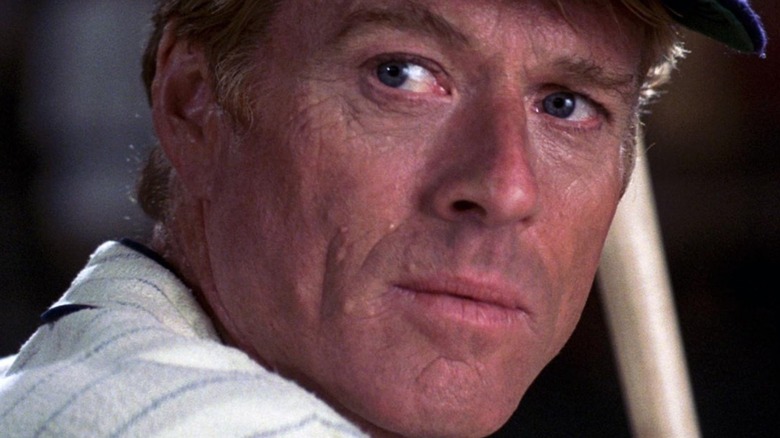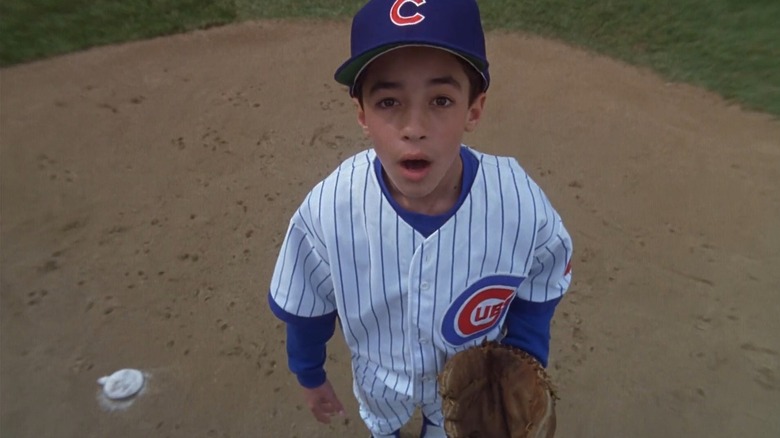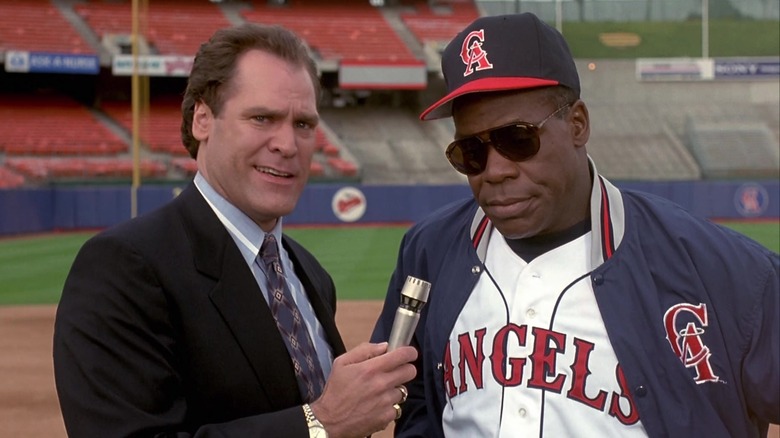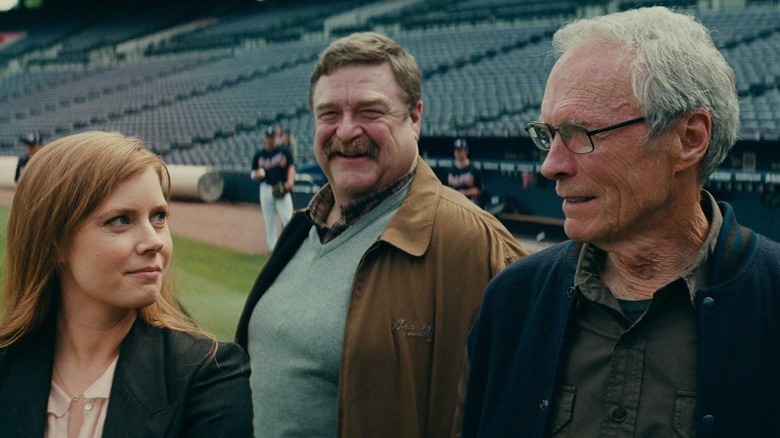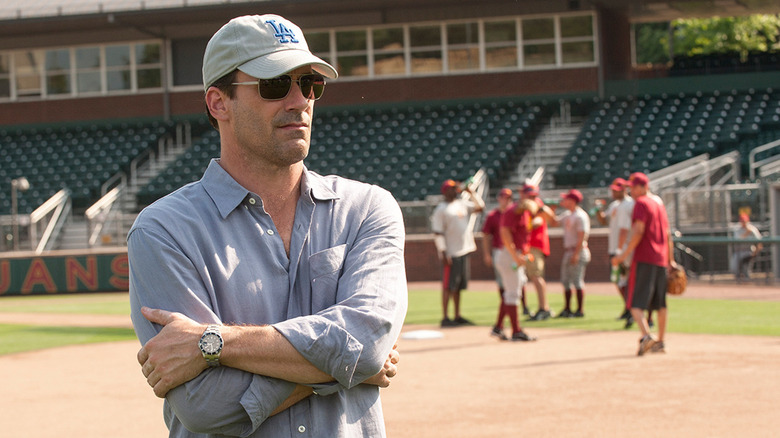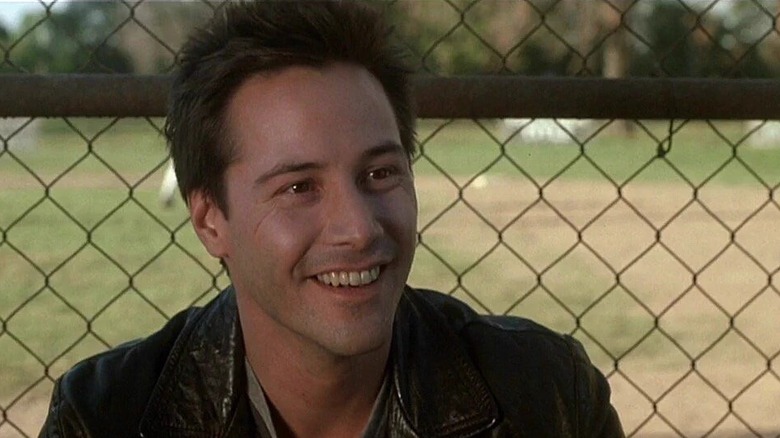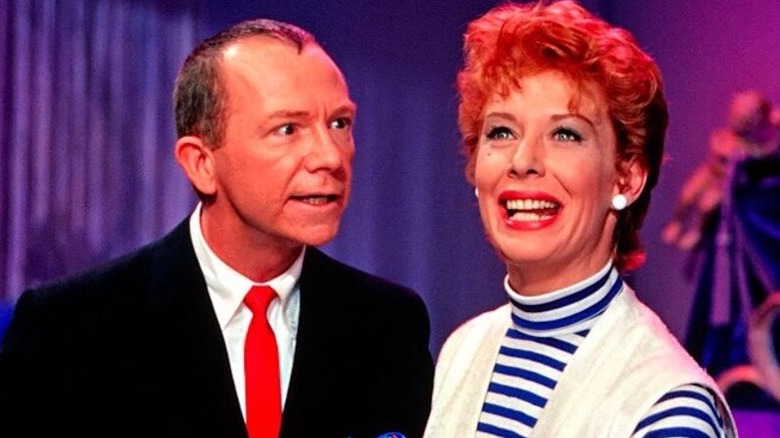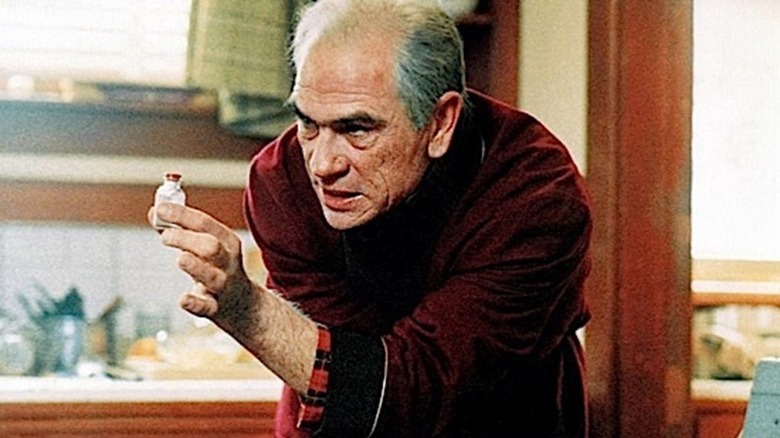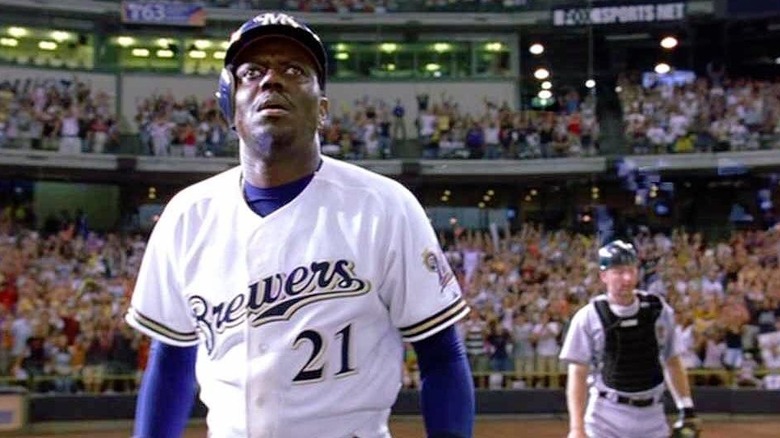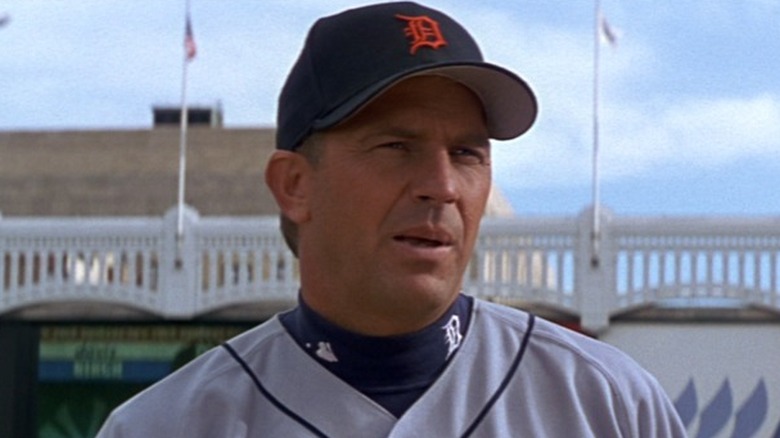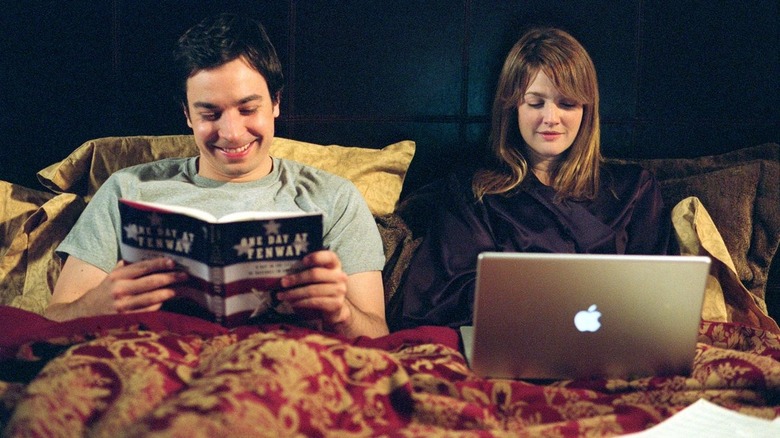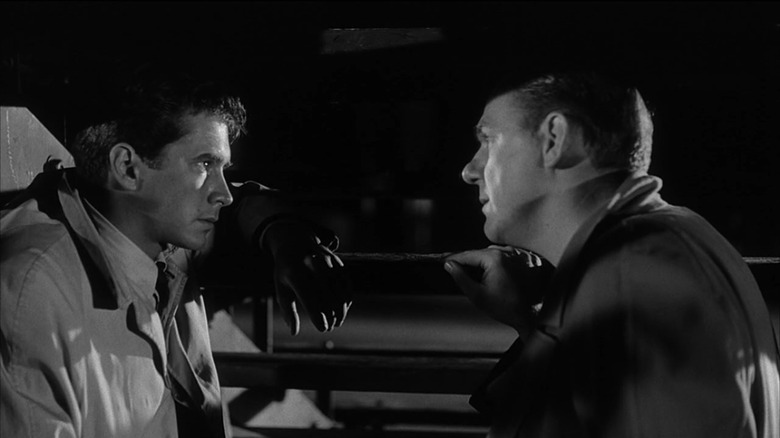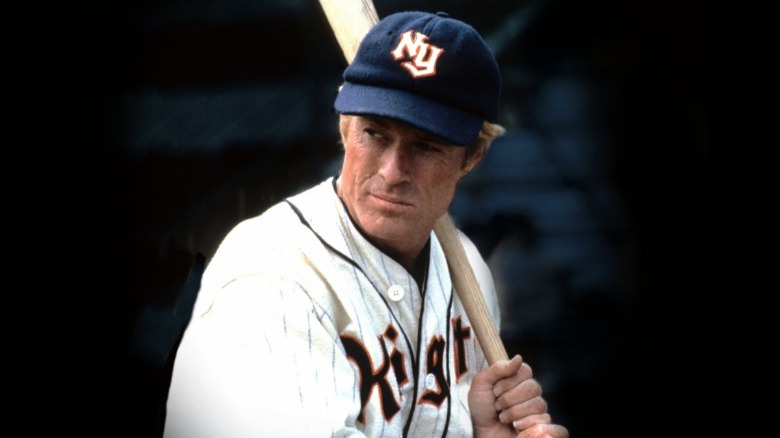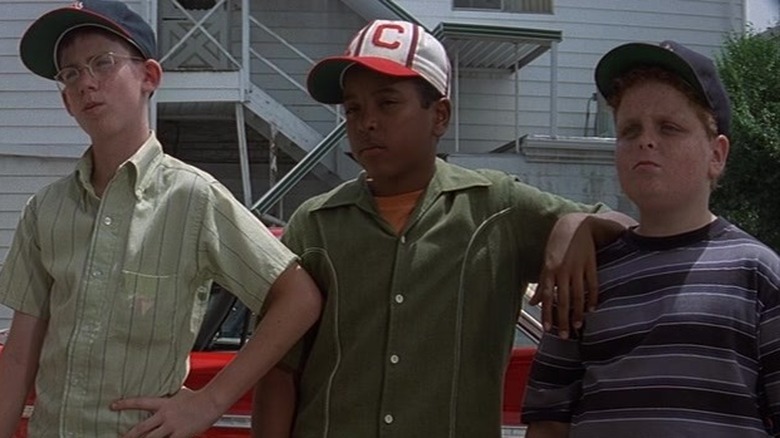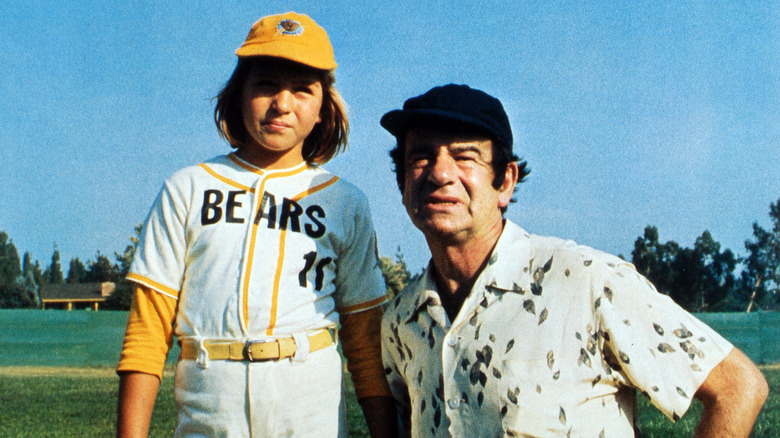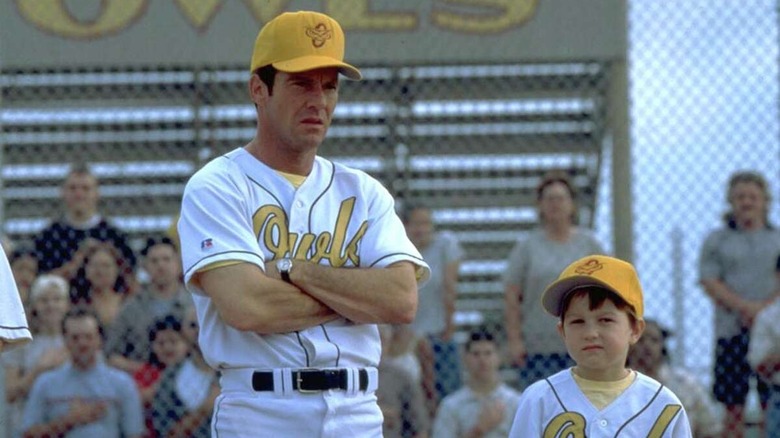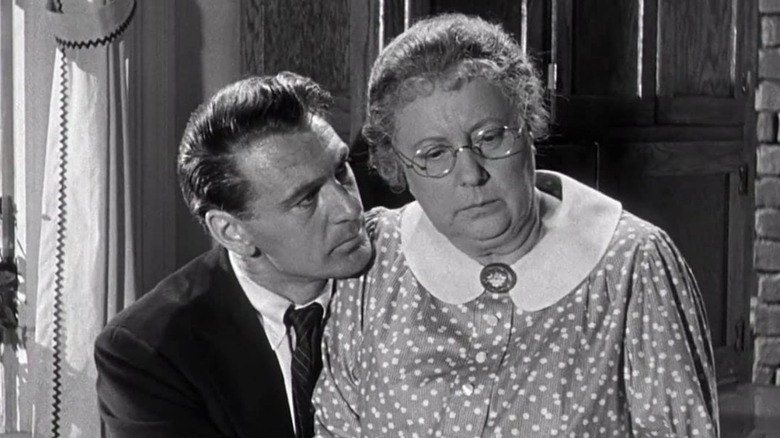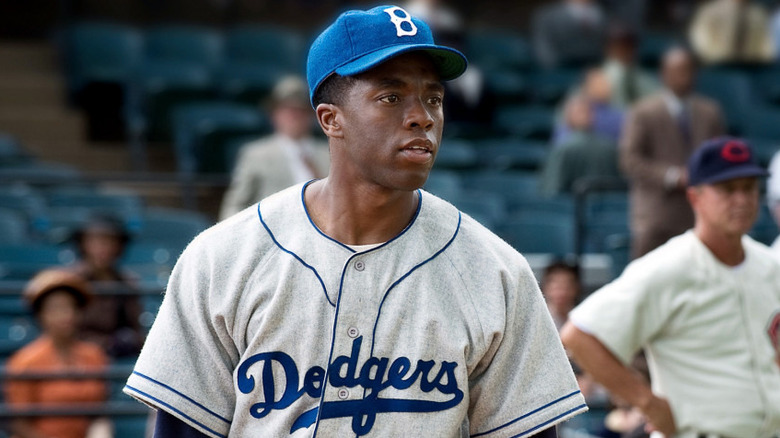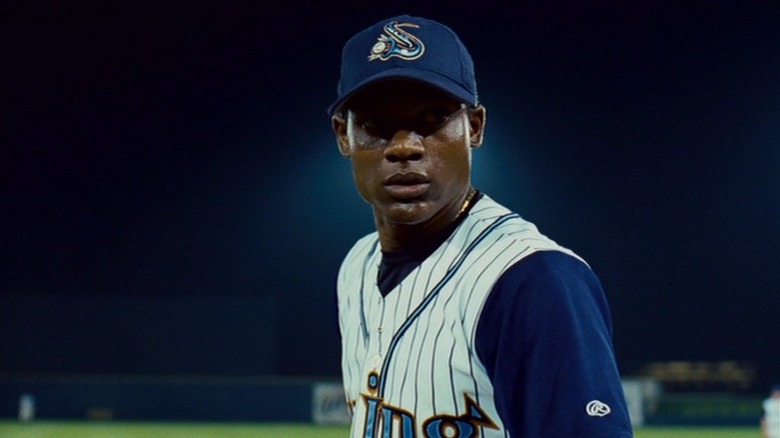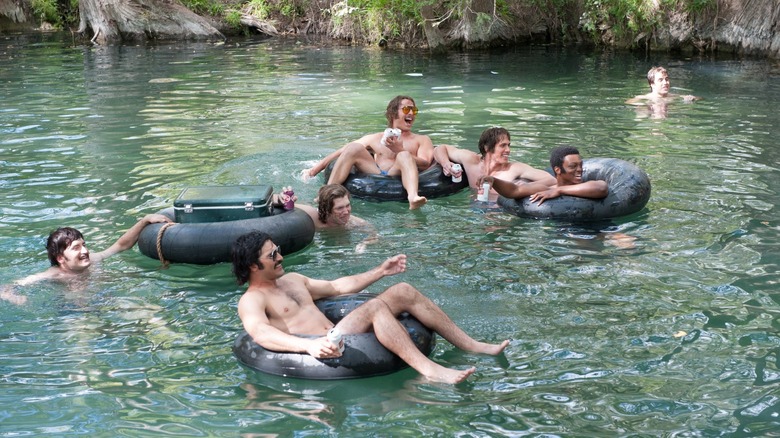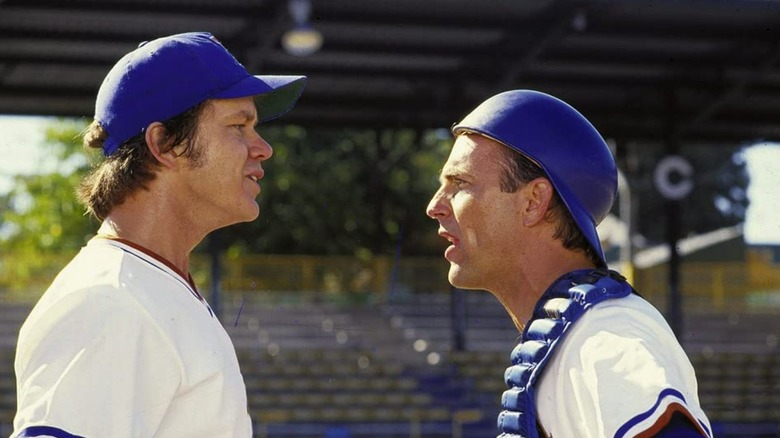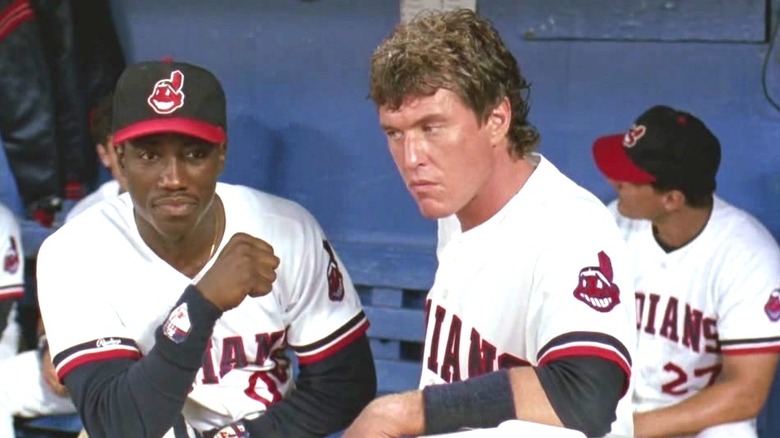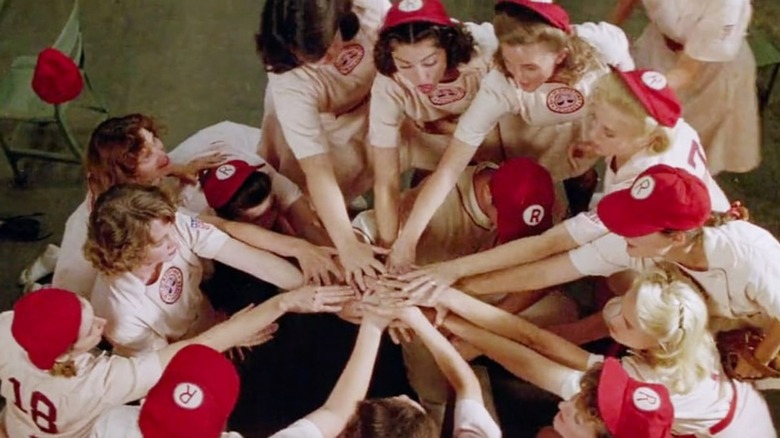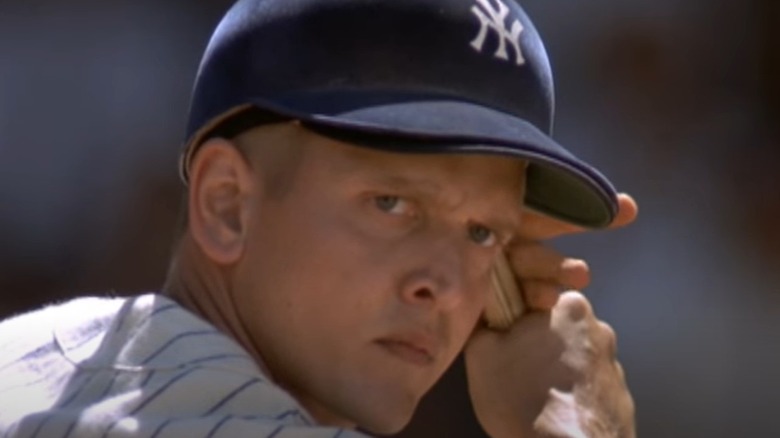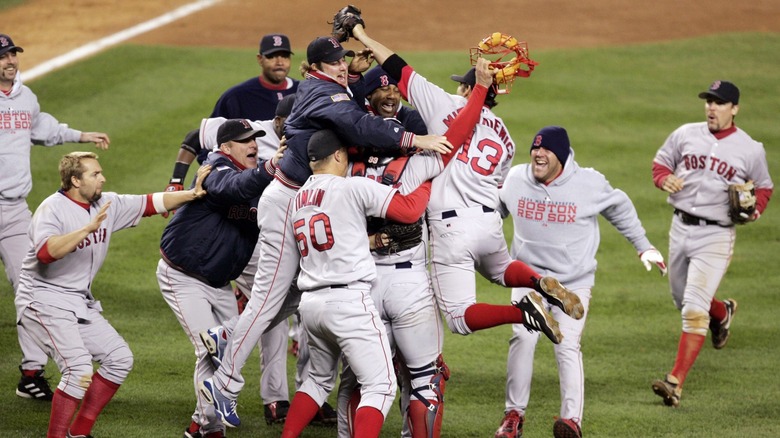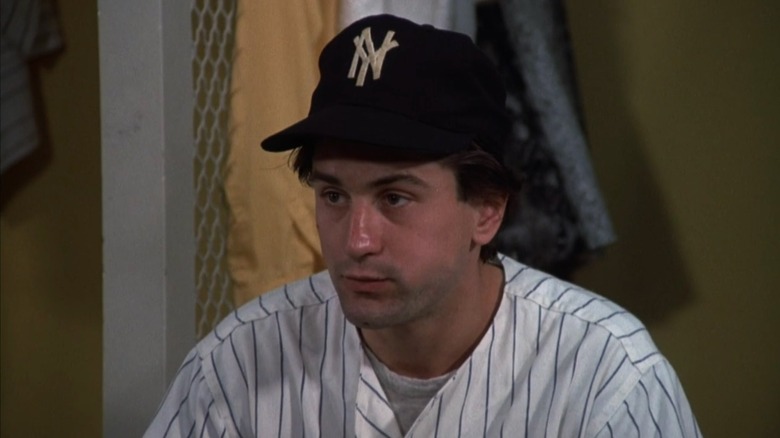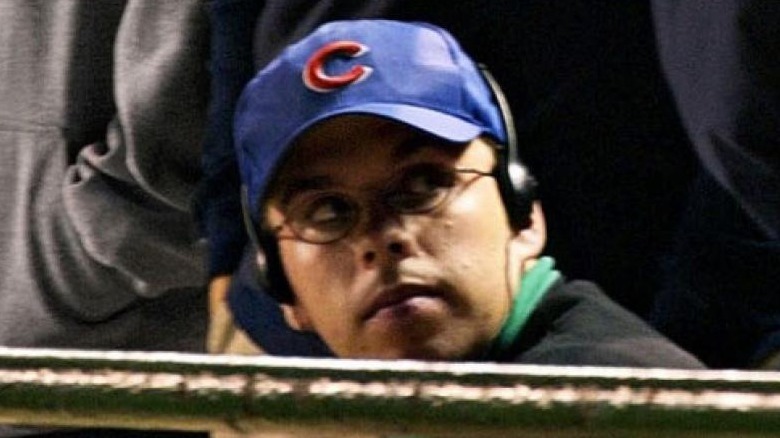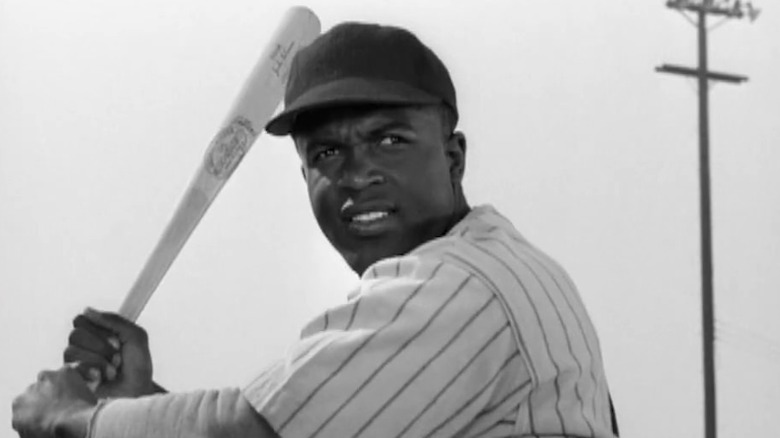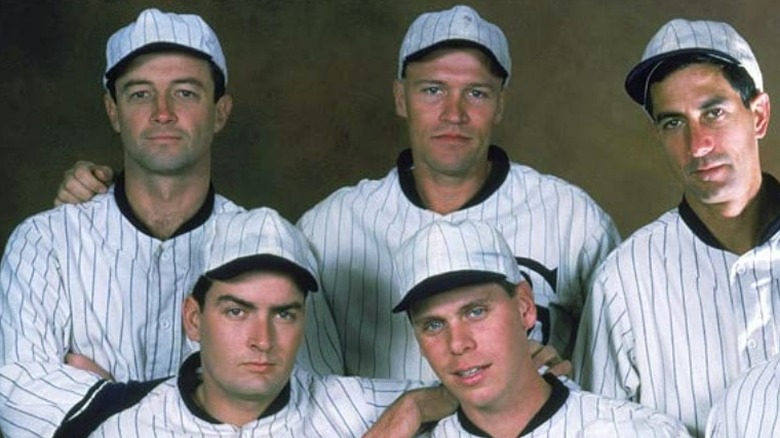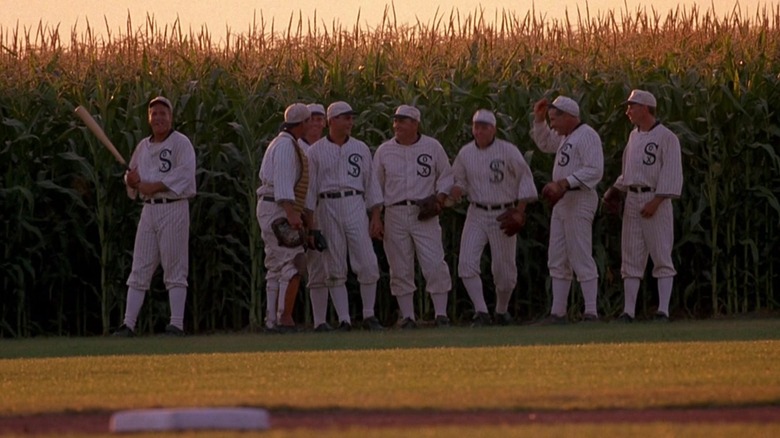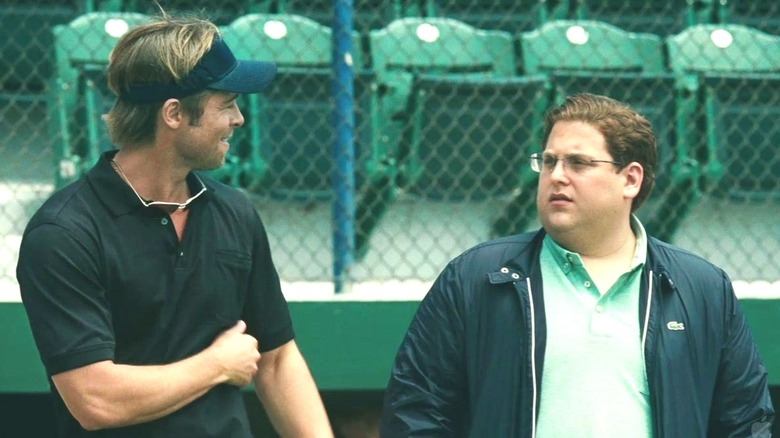The 30 Best Baseball Movies Of All Time, Ranked
There's a reason why we are a nation of baseball movies, and why films about luging are comparatively difficult to come by. Baseball is meant to unspool slowly, reel by reel; the bats swing swiftly, the pitches slap the glove at startling velocity, and the throw to second will be over and done with before you've had a chance to glance up from your $12 beer. But these moments are brief explosions of sound and speed. Much of the baseball experience involves watching, and waiting, and allowing the story to unfold. It is a sport for a drawn-out saga, not for binging 30 minutes at a time.
You will never find a group of baseball fans who will agree on the proper order for 14 of the best films about the sport. It may even be difficult to get them to agree on which movies should make the list to begin with. But such are the riches of baseball cinema, so sit back, grab your peanuts and cracker jacks, and enjoy some of the finest movies ever made about America's national pastime.
30. Rookie of the Year
"Rookie of the Year" presents the audience with the ultimate childhood sporting fantasy of, what if, by some miraculous fluke, a kid could not only play Major League Baseball but play well. The 1993 family-friendly comedy stars Thomas Ian Nicholas as a little leaguer named Henry, whose broken arm heals too tightly, giving him a formidable fastball. After being noticed by chance at a Chicago Cubs game, Henry is brought on as a professional relief pitcher for the team, despite not even being old enough for high school.
"Rookie of the Year" requires a healthy suspension of disbelief in the idea that an adolescent could be signed to play professional-level baseball, but there is a lot of genuine heart at the movie's core. Nicholas effectively captures the shock and awe of getting to play in the majors as a child, while forming a tight rapport with Amy Morton as his character's on-screen mother, Mary. An admittedly absurd premise, "Rookie of the Year" is elevated by its cast from what could've otherwise been a disposable family movie to a widely beloved millennial favorite.
29. Angels in the Outfield (1994)
The original 1951 "Angels in the Outfield" left its heavenly presence to the imagination, with its divine helpers never fully appearing on-screen as they enlightened a harsh baseball manager. By contrast, the 1994 remake not only opts to put the angels in the spotlight but takes on the perspective of a young boy praying for his favorite team to win to keep his parents together. Though this places a tendency on slapstick comedy that was prevalent in children's movies at the time, the 1994 remake ages considerably better than its predecessor.
The 1994 "Angels in the Outfield" has a stacked cast, with Joseph Gordon-Levitt starring as precocious adolescent Roger Bomman. Even at an early age, Gordon-Levitt is a natural on the big screen, playing well opposite silver screen veterans Danny Glover and Christopher Lloyd. As much a product of its era as "Air Bud" or "The Mighty Ducks," "Angels in the Outfield" is a blast from the past for millennials and set the template for Disney Channel Original Movies that would proliferate shortly thereafter.
28. Trouble with the Curve
2012's "Trouble with the Curve" stands as the narrative counterpoint to "Moneyball," as baseball changed in the face of embracing raw statistical analysis in its recruiting over qualitative observation. Clint Eastwood stars as aging talent scout Gus Lobel, who is not only running the risk of becoming obsolete but is steadily losing his eyesight as he progresses into his twilight years. As Gus embarks on his last scouting tour for the Atlanta Braves, he is assisted by his estranged daughter Mickey (Amy Adams), with the two addressing their unresolved issues along the way.
As it becomes increasingly rare due to Eastwood's own age and commitments behind the camera, any opportunity to see him on-screen is a delight. Eastwood has been playing crotchety old men with a heart of gold and complicated family dynamics for years, and he confidently delivers the goods here, framed against a timeless baseball backdrop and a strong co-star in Adams. Outside of this, "Trouble with the Curve" is a relatively safe, paint-by-numbers affair, that competently tells its story without much by way of surprise.
27. Million Dollar Arm
As wild as it may seem, it wasn't until 2008 that the first Indians were signed to a Major League Baseball team, with Rinku Singh and Dinesh Patel leading the way. Singh and Patel's recruitment story is recounted in the 2014 sports biopic "Million Dollar Arm," with the two discovered in India by sports agent B.J. Bernstein (Jon Hamm). After noticing Singh's (Suraj Sharma) and Patel's (Madhur Mittal) natural talent during an open contest in India, Bernstein brings the two with him back to the United States for MLB tryouts.
"Million Dollar Arm" is competently made and shines a light on one of the more fascinating baseball recruitment stories in recent years, it just focuses on the wrong character as its protagonist. Hamm does an admirable enough job as Bernstein, giving him his own arc as he guides Singh and Patel through life in America. Despite this curious approach to the story, "Million Dollar Arm" weaves its own unique underdog story that hits all the right notes with its strong cast effectively hitting their marks.
26. Hardball
Keanu Reeves leads the 2001 coming-of-age sports film "Hardball," with the movie's story feeling like a cross between "The Bad News Bears" and "Cruel Intentions." Reeves plays hard-luck gambler Conor O'Neill, who agrees to coach a little league team in inner-city Chicago to settle his outstanding debts. As O'Neill progresses through the baseball season, he learns to genuinely care for the kids on his team, while overcoming his own gambling addiction.
"Hardball" plays it relatively safe with its tried-and-true formula up until the end, with a heartbreaking reminder of the everyday violence rocking the community completely upending the movie's inspirational tone. This tragic realism is buoyed by an earnest performance from Reeves and much of the young cast, including a young Michael B. Jordan in one of his earliest on-screen roles. Outside of its tonal swerve, "Hardball" is a predictable look at a self-centered cad rediscovering the value of selflessness that hits most of the right notes.
25. Damn Yankees
George Abbott and Douglas Wallop's hit Broadway musical "Damn Yankees" received its own cinematic adaptation in 1958, with most of the stage version's main cast reprising their roles on the big screen. Obsessive Washington Senators fan Joe Boyd (Robert Schafer) agrees to sell his soul to the Devil (Ray Walston) in exchange for becoming a youthful, star player for the team to reverse their fortunes. As the transformed Boyd plays under the pseudonym Joe Hardy (Tab Hunter), the Devil has his minion Lola (Gwen Verdon) attempt to seduce him so Boyd can't back out of their deal by the end of the season.
For better or worse, "Damn Yankees" is a largely faithful translation of the stage musical to the silver screen, but it fails to take full advantage of the cinematic medium. Sequences are largely static presentations, rather than getting the camera to engage more actively with the proceedings on screen. Still, the musical numbers are solidly delivered, the humor holds up, and Verdon steals the show, alternating between bouts of emotional vulnerability and relentless sensuality as Lola.
24. Cobb
Perhaps the most divisive and complicated figure in baseball is Ty Cobb, who played in the majors from 1905 to 1928, primarily with the Detroit Tigers. Despite Cobb's impressive career achievements in the early days of the sport, his violent temper on and off the field and intense personality became a subject of notoriety. The more controversial aspects of Cobb's life are explored in the 1994 biopic "Cobb," with Tommy Lee Jones playing the titular ballplayer as he works on his autobiography with ghostwriter Al Stump (Robert Wuhl).
The most striking thing about "Cobb" is that, despite its protagonist's stellar performance on the field, there is relatively little baseball seen in the movie. Instead, the biopic focuses on Cobb's abusive behavior as he viciously lashes out at anyone around him, with Jones really leaning into how cruel his character could reputedly be. Stories don't always have to have likable protagonists, and "Cobb" certainly puts that idea to the test, with the movie well-made but also unpleasant to watch.
23. Mr. 3000
The late, great Bernie Mac starred in a number of films before his sudden passing in 2008, but arguably his greatest role outside of a larger ensemble effort was in 2004's "Mr. 3000." Mac stars as retired major league first baseman Stan Ross, who built an entire business empire around allegedly reaching the milestone of 3000 career hits. However, after a reevaluation of his sporting career, Ross learns he is actually three hits short of the achievement and re-signs with the Milwaukee Brewers in the team's final month of the season to make up the difference.
"Mr. 3000" is perhaps the most understated lead performance of Mac's career, an approach that serves him well, as Ross relearns how to be a team player and the value of humility as he returns to the field. The overarching story itself is predictable and formulaic, but Mac and his co-star Angela Bassett make the most from the material that they're given. "Mr. 3000" is a story about redemption and learning that the possibility to grow and change remains an open one in middle age, with these themes made all the more bittersweet by Mac's passing four years later.
22. For the Love of the Game
America's favorite baseball movie involving rotary saw accidents, this 1999 Kevin Costner drama attempts to shoehorn in an epic love story when baseball itself already offers all the possible romance a single movie could need. No, you drag this one into the queue to hear legendary announcer Vin Scully say that Costner's aging pitcher is "pitching against time ... to push the sun back up in the sky and give us one more day of summer."
What's frustrating about "For the Love of the Game" is that threads of greatness are present: the creative narrative frame of a single game, elements of a father-son relationship, the unusual focus on a fading star rather than a rising one, and an emphasis on just how much effort the entire team must expend when a pitcher pulls off a perfect game. Chop off half the movie, and you have a spectacular story. That rotary saw is never around when you actually need it.
21. Fever Pitch (2005)
Before he was hosting "The Tonight Show," Jimmy Fallon paired up with Drew Barrymore for the baseball-themed romantic comedy "Fever Pitch," loosely adapting the Nick Hornby novel of the same name. Set against the backdrop of the Boston Red Sox finally beating the Curse of the Bambino and winning the World Series in 2004, the 2005 movie follows lifelong Red Sox fan Ben Wrightman (Fallon). As Ben begins dating Lindsey Meeks (Barrymore), she becomes justifiably concerned that he loves the Red Sox more than her, with Ben forgoing important events together to watch the team at Fenway Park.
"Fever Pitch" is pure romantic comedy schmaltz, but the genuine chemistry between Fallon and Barrymore makes the entire movie work as they go through the ups and downs of their relationship. Released less than a year after the Red Sox won the World Series for the first time since 1918, "Fever Pitch" captures a historic moment for the team and the sport, using this framing well — following a rewrite during filming. More entertaining and charming than a sports-centered romantic comedy has any right to, "Fever Pitch" is so good that even a Yankees fan could enjoy it.
20. Fear Strikes Out
The lifelong struggle of professional ballplayer Jim Piersall with his bipolar disorder is the subject of the 1957 biopic "Fear Strikes Out," starring Anthony Perkins as Piersall. Based on Piersall's 1955 autobiography, the film has Piersall pursue a career in baseball in an effort to gain the approval of his domineering father John (Karl Madden). Though Piersall succeeds in signing with the Boston Red Sox, his unresolved issues are far more skin-deep, as his mental health impacts his life and performance on the field.
The biggest conflicts in "Fear Strikes Out" aren't in the ballpark at all, but within Piersall's own mind, most evidently with the violent lengths he undergoes to live up to his father's ideals. It's an absolutely heartbreaking performance for Perkins, who lays it all emotionally bare as he brings Piersall's deeply embedded personal demons to life. The baseball sequences themselves have enough verisimilitude to them, but "Fear Strikes Out" really is a rare portrait of mental health sensibilities in the '50s delivered in an effective and quietly haunting way.
19. The Natural
Many fans think baseball has supernatural qualities, and we find confirmation in this bit of absolute fiction. A more traditionally constructed movie than "For the Love of the Game," "The Natural" is considered one of Robert Redford's finest works. It follows Roy Hobbs' career through the early to mid-20th century, and if you're fond of magic bats, suspiciously timed lightning strikes, and players who die from crashing through the outfield wall, "The Natural" is for you.
At the heart of "The Natural" are Roy Hobbs' fable-hero qualities. This dude literally smashes the cover off the baseball. He doesn't just hit a home run; he knocks out the stadium lights. This is how modern Americans regard our gods. They are endowed with mythical powers and magical abilities. They play while they bleed and they play fully honest. Roy Hobbs is in the same league as Paul Bunyan and John Henry — after all, those tropes had to start somewhere.
18. The Sandlot
This is the baseball movie that's not, at its heart, about baseball. "The Sandlot" is a celebration of childhood and the cresting point between juvenility and adolescence, when, if you're lucky, scary neighborhood dogs are your main source of worry. It's a film that functions well for every generation: Millennials and under get to see what it was like to wander more than 15 feet from the front yard, while everyone else gets to remember life in the time of analog. It was a less civilized, more disorganized time.
"The Sandlot" hinges on the importance of understanding and celebrating the importance of what came before. As the group of boys plays a night game illuminated by Fourth of July fireworks, we as viewers know that the John F. Kennedy and Martin Luther King assassinations are just a few months away, and that the innocent era depicted in the film wasn't so innocent. But every era has a right to its own nostalgia, and we can all find at least a little of our own here.
17. The Bad News Bears
There was quite possibly never a time when Walter Matthau didn't specialize in being perpetually disgruntled, and he's in righteously Constant Mad Mode here. The bowl-cut precursor of "The Mighty Ducks" doesn't even let this trope machine of a team win — and that is its saving grace.
This movie could never be made in 2022, and that is good news. Entire scenes of "The Bad News Bears" are wall-to-wall hate crimes. What was released as a feel-good comedy in 1976 is now utterly inappropriate for children, adults, and pretty much everybody else. Racial and homophobic epithets? They're all here! Adults smoking around kids? You got it! Kids smoking too? Sure! Don't miss the drunk driving and Grandpa Matthau hurling a beer at Tatum O'Neil!
But the thrust of the film is pushback against a scrubbed down, Instagram-perfect, winner culture, arguing that a W in the books isn't necessarily the most important part of the day. After Matthau begins to take tournament advancement too seriously, he undoes it all by putting the team's least athletic players into the lineup when it matters most. So, they lose, and they're fine with that. They take themselves on their own terms. Perhaps this Carter-era movie, despite all its ugliness, has something nice to say.
16. The Rookie (2002)
While professional sports may feel like a young athlete's game, every now and then, an individual defies conventional expectations about age and manages to live out the dream. This axiom is at the heart of 2002's "The Rookie," based on real-life ballplayer Jim Morris making his MLB debut at the age of 35. Played in the film by Dennis Quaid, Morris is already an established family man with a career by the time he is noticed by talent scouts, torn between finally pursuing his dreams or sticking to domestic safety.
"The Rookie" plays out like a more grounded, contemporary echo of "The Natural," with a man given one last chance to fulfill his longstanding ambition of being a professional ballplayer. What sets "The Rookie" apart is its protagonist being firmly rooted in his love of family, with co-star Rachel Griffiths striking up a solid chemistry with Quaid as Morris' wife Lorri. Really, "The Rookie" is a story of fathers and sons, with Morris trying to find time to be there for his son (Angus T. Jones) while attempting to reconcile with his own father (Brian Cox). A no-frills approach to a lifelong love of the game, "The Rookie" relies on its strong performances to overcome its relatively predictable story and tendency for understatement.
15. The Pride of the Yankees
Released in 1942, just after the tragic death of its subject, "The Pride of the Yankees" is what happens when a culture attempts to cram immense respect for a real person through the Hollywood machine. Gary Cooper plays a 45-year-old college freshman whose nightmare mother carps at his new wife. He plays baseball and dies. Also, there's a complete ballroom dance number for absolutely no reason. It shouldn't work, but somehow it does.
Affection for the main character overwhelms the movie itself. Lou Gehrig's real story was far more poignant and interesting than what's depicted in the film, including the actual text of his famous "luckiest man" speech. Yet, this movie spends more time on his wife and mother arguing about wallpaper than it does on the enormous scope of Gehrig's tremendous accomplishments.
Contrast this film with "The Bad News Bears"; the '70s movie is entirely forward with its most cringetastic elements, while "The Pride of the Yankees" is, on its surface, entirely wholesome. However, this movie features precisely five Black people, among them a shoe shiner and a harassed train porter. But, in a deeply sad way, that's the point — no one heading up the film seemed to think this was a problem.
Artistic touches such as the long shot of Cooper's figure fading into the shadows after his final game serve as poetic images that celebrate not only Gehrig, but the sport itself. "The Pride of the Yankees" places Gehrig's life in the context of the devastating war the world has just entered, and it's clear the nation is desperate for some uplift.
14. 42
Jackie Robinson broke baseball's color barrier five years after the release of "The Pride of the Yankees." Baseball being baseball, however, that event meant significantly more than the simple entry of a name on a lineup. His appearance as a Dodger in April of 1947 was a cultural watershed. The man who was spit on, spiked, and subjected to every possible social humiliation became the first person whose number was retired across an entire American sport.
This film was hampered by the decidedly uncomfortable issue of depicting bald racism in a nation painfully struggling to come to terms with its sins. It's difficult to watch a gas station washroom attendant refuse entry to another human being on the basis of the color of his skin, but it's a reality within living memory.
That it took until 2013 to put out a movie about Robinson's life is an indictment of Hollywood, but the late Chadwick Boseman performs admirably as the title character. It's a long-overdue reminder of not only Jackie Robinson's achievements, but also his sacrifices. As always, however, the real story is infinitely more riveting than the movie. Robinson was a flesh and blood person, and to avoid reducing him to his historical circumstances, it's important to continue exploring his full life.
13. Sugar (2008)
You don't have to be in the MLB to be a ballplayer; all it really takes is a genuine love for the game, and that rings true for the 2008 drama "Sugar." The movie stands as a reevaluation of the American Dream, with Dominican baseball prodigy Miguel Santos (Algenis Perez Soto) moving to the United States with hopes to play in the majors. As he plays in the minor leagues, Santos faces fierce racism and questions whether a career in professional baseball is really the key to a successful life.
Anchored by Soto's heartfelt performance, "Sugar" isn't so much a movie about losing one's dreams in the face of reality as it is about recalibrating expectations. For all the adversity that Santos faces after relocating stateside, that love of baseball still is a key part of his personality, all that changes is how he applies it. It's refreshing to get a baseball movie that isn't preoccupied with life in the majors, with endings that aren't clean victories, with "Sugar" delivering plenty of surprises along the way.
12. Everybody Wants Some!!
After helming a stoner coming-of-age period piece with "Dazed and Confused," acclaimed filmmaker Richard Linklater turned his attention to college for his 2016 comedy "Everybody Wants Some!!" Set at a Texas college in 1980, baseball pitcher Jake Bradford (Blake Jenner) gets to know the rest of his team as he starts his freshman year. In the days leading up to the start of the semester, Jake and his new teammates bond over drunken shenanigans and baseball practice.
The only reason that "Everybody Wants Some!!" doesn't rank higher is because, while its main characters are brought together by baseball, the great American pastime itself isn't vitally necessary to the plot. The entire film is set during the sport's offseason, with the characters discussing the game and practicing, but without taking on any other schools for a full game. Still, Linklater takes full advantage of both the 1980 period setting and the hijinks of college sports, creating an easygoing look at the college experience through the eyes of its laidback protagonists.
11. Bull Durham
"Bull Durham" is a film so embedded in American baseball culture that its references have become threadbare, but don't let that dissuade you from enjoying its finer points. It shines a grimy, fly-speckled spotlight on the often-ignored pipeline of Major League Baseball: the minors, a culture all its own. It's a land of buses and dumpy little stadiums that stage the likes of Toilet Seat Cushion Night. That's a world well worth exploring. Alas, before long, "Bull Durham" leaves the smaller ballparks in the dust.
We're supposed to find this movie endearing and classic, as it is one of the first major Hollywood films to delve into baseball's sexual undercurrents, but the fact remains that one of the main characters, Annie, chooses a baseball player a season to adopt as her Official Student And Also Part-Time Lay, which is icky. It just is. The fact that Annie reads poetry to her yearly much-younger man and drapes it all in the rhetoric of "the Church of Baseball" does not make it any less icky. Nor does the fact that she considers herself a spiritual mentor. It is exactly as gross as it would be if a middle-aged male golf fan selected one rising LPGA standout per summer to join him on his futon with his Carl Sandburg anthology.
"Bull Durham" is most famous for Kevin Costner's "I believe in..." speech. One of the things he believes in, he announces, is his genitalia. If the film laid this gently aside in favor of the rarer and more interesting insight that sometimes dreams just don't come true, perhaps it would rank higher. Otherwise, the main characters are named Nuke and Crash, which tells you pretty much all you need to know.
10. Major League
There was a time when Charlie Sheen wasn't a punchline. That time was 1989, and the place was this movie. It stars the Cleveland Indians (now the Guardians) and the team's sad and beaten fanbase, which is ... still the case. Someone needs to make a movie about that.
"Major League" is ostensibly a clichéd tale of a ragtag band of losers who defy the odds to win it all. The movie has two villains: the team's owner, Rachel Phelps, who is sabotaging the season, and the New York Yankees. The likes of "The Pride of the Yankees," along with so many other baseball-oriented films, have so firmly established the Yanks as a terrifying foe that it's a wonder that the team actually takes the trouble to show up on game days.
What endures about this film is that it doesn't exclude the long-suffering fans. It would take until 2005's "Fever Pitch" until that aspect of fandom was more fully explored (albeit as a rework of a British book about soccer). Most importantly, as writer-director David S. Ward told ESPN, the movie's Cleveland scenes were shot in Wisconsin, which is quite likely the most ironic diss in the history of baseball cinema. Even in its own movie, Cleveland gets decided shade.
9. A League of Their Own
Outside of the Greatest Generation, few even knew of the existence of the All-American Girls Professional Baseball League before this film, or thought all that much about what women endured on the homefront during World War II. "A League of Their Own," which is currently slated for a TV revival on Prime Video, dragged them back into the spotlight in 1992. Its swinging Hans Zimmer soundtrack highlighted a sisterly rivalry that spanned an entire summer.
One of the film's standout scenes features the heartbreaking awkwardness of one of the players standing in front of the final rosters, unable to see if she has made any of the teams because she cannot read her own name. Touches like this, including nods to the Black and other minority women who were not invited to the party, elevate "A League of Their Own" over the usual schmaltz. That filmmakers also refused to jam a half-baked romantic subplot into the script is a tribute to the seriousness of the material.
8. 61*
Baseball has been choking on statistics since before it was cool to choke on statistics. So, when one of those statistics has an asterisk, we're gonna talk about it, and talk about it, and talk about it until the man trying to post some new numbers suffers acute hair loss.
"61*" is about Roger Maris, but it's not really about Roger Maris. It's more of an exploration of the weight of fame and modern athletic expectations. Directed by Billy Crystal, "61*" explores Maris' 1961 attempt to break Babe Ruth's record of 60 home runs in a single season. The asterisk alludes to the fact that Maris set the record in a season of 162 games, while Ruth managed the feat in 154.
The intense stress of the season so affected Maris that his hair began to come out in clumps. Was this still a game? That the film opens in 1998 with the Maris family on hand to watch Mark McGwire break the record again is unintentionally ironic, as McGwire's later admissions of doping earned him an asterisk of his own.
Maybe it's a cursed record. Maybe it's not. Or maybe hitting a small, hard ball made of yarn and cowhide with a big stick is just really, really difficult.
7. Four Days in October
While "Fever Pitch" was set in the midst of the Red Sox's astonishing march to World Series victory in 2004 through an incredible comeback, the 2010 documentary "Four Days in October" covers the actual historical event. The film covers the last four games in the 2004 American League Championship Series, with the Red Sox one game away from being eliminated after losing three games in a row to the Yankees. With the odds and history running against them, the Red Sox set out to win the series' final four games in a row, hanging on by a wing and a prayer.
"Four Days in October" stands as one of the best documentary films made by ESPN for any sport, let alone baseball. The movie opens with the full historical background of the Yankees-Red Sox rivalry, including the Curse of the Bambino, grounding the narrative in a relevant context before launching into the 2004 championship. Though "Four Days in October" features much of the usual talking head interview style from many ESPN documentaries, it also brings in fans to reflect on the event, underscoring how the victory truly was as a pure storybook moment for baseball.
6. Bang the Drum Slowly
Before "The Godfather Part II" or "Mean Streets," Robert De Niro starred in the 1973 baseball drama "Bang the Drum Slowly" as simple-minded major league catcher Bruce Pearson. After Bruce is diagnosed with a terminal illness, he and his best friend, pitcher Henry Wiggen (Michael Moriarty), attempt to keep it a secret from the rest of the team throughout the season. Along the way, Henry helps Bruce face his own impending mortality while learning from his friend's naively innocent perspective on life.
It's wild to see De Niro just on the cusp of catapulting into the Hollywood big time, bringing a uniquely raw drive before he would be cemented as one of the biggest movie stars in the world. "Bang the Drum Slowly" could've easily been a morose, unrelentingly melancholic slog, but De Niro and Moriarty's on-screen dynamic brings the movie to another level, with an undercurrent of humor. Just like its protagonist attempting to embrace one last dose of life, "Bang the Drum Slowly" excels when it leans into its life-affirming moments rather than its tragic ones, all under the romantic backdrop of baseball.
5. Catching Hell
Like "61*," "Catching Hell" explores the nauseating underbelly of the majors. An installment of ESPN's "30 for 30" documentary series, this dark look at the tipping point of emotional fandom is especially relevant in the age of online pile-ons.
If you're a Cubs fan, you will not like this doc. Everybody else will enter the episode mildly disliking the Cubs for being the Cubs, then exit the other side swearing off Wrigley gum for life. An exploration of the events of Game 6 of the NLCS in 2003, "Catching Hell" details the moments surrounding the play in which Cubs fan Steve Bartman infamously reached up for a ball hit in foul territory. What happened next drove Bartman into hiding and presaged the social media phenomenon of trial by mob.
"Catching Hell" largely lets Cubs fans hang themselves ("We all knew we were gonna lose Game 7!") but it's uncomfortably easy for everyone to see him or herself in all the fist-shaking. It's just a matter of whether or not the scapegoat in question happens to be wearing your jersey — and even then, no one is safe.
4. The Jackie Robinson Story
As far as biopics go, it's hard to top them when the subject of the film plays themselves as the protagonist, and "The Jackie Robinson Story" stands as the clearest example of this. The 1950 film stars Robinson as himself, filmed following his third season with the Brooklyn Dodgers, and chronicling his start playing in Major League Baseball despite widespread segregation at the time. Along the way, Robinson marries his childhood sweetheart Rae (Ruby Dee) after serving in the military during World War II and playing on farm league teams.
With all due respect to the subsequent portrayals and biopics, nobody plays Jackie Robinson better than Jackie Robinson, and the ballplayer has surprisingly solid chops in his sole acting performance. "The Jackie Robinson Story" doesn't shy away from openly depicting the prejudices its eponymous protagonist faced at the start of his career, another element contemporary audiences may take for granted from a film released in 1950. Along with "Pride of the Yankees," "The Jackie Robinson Story" sets a high bar for baseball biopics, and none more important than Robinson sharing his own life experiences on the big screen.
3. Eight Men Out
I doubt the directors put their heads together on this, but 1988's "Eight Men Out" laid the historical foundation for 1989's "Field of Dreams." "Eight Men Out" tells the tale of the 1919 World Series between the Chicago White Sox and the Cincinnati Reds. Payouts to members of the Chicago team to throw the Series resulted in the Black Sox Scandal, which got every man involved booted from the game for the rest of their lives.
It was an event on which the whole sport teetered. Were the integrity of the game placed in doubt, it would collapse. So, commissioner Kenesaw Mountain Landis immediately blacklisted the players and kept them blacklisted, a stomp-down that would reverberate once again in Cincinnati a century later, when player-manager Pete Rose was banned for life for betting on baseball. As ESPN reports, that's still kind of a sore spot.
"Eight Men Out" isn't flashy. It isn't hilarious, or iconic, or gaspingly dramatic. It tells a (mostly) true story, and solidly so. It is for this reason that films like "Eight Men Out" need to be made. They need to be made because they remind us that, no matter how much baseball might infuriate us, no matter how often we fans feel taken for granted and lectured to, the sport hinges on honor. Every inning we have is one to be cherished.
2. Field of Dreams
Well, the forces behind "Field of Dreams" are of the opinion that Shoeless Joe Jackson got a raw deal back in 1920 when he was bounced from baseball, and you are going to hear about it. Farmer Kevin Coster thinks the fact that Jackson, despite taking the money to tank the World Series, later reversed course and played to the best of his ability is what's important here. Pete Rose would like a word.
"Field of Dreams" explores the mystical aspects of the sport in a way that's simultaneously more obvious and less ham-handed than the attempt in "The Natural." You have time travel. You have corn. You have James Earl Jones, and Amy Madigan chewing out a fellow PTA parent. But, in the end, "Field of Dreams" is about the cleansing nature of childhood innocence and forgiveness. As always, baseball is at its best when it's embracing all that is good in life, not just baseball.
Watch it every year before Opening Day. Even if your team is perennially in the basement, you will rise from the couch with hope.
1. Moneyball
"Moneyball" brings together the cliches of every single sports movie and remixes it into an introduction to the statistical revolution of modern baseball. It balances the science of the game with nostalgia and realism. It lifts the curtain of the front office and reminds us of the realities beyond the diamond, but without leaving behind a cynical sheen.
The real story of the adoption of sabermetrics is far longer and more complex than the story told here, but what's important in the context of the movie is how drastically baseball has changed since "Field of Dreams" was released. Following the efforts of manager Billy Beane to better the fortunes of the Oakland Athletics (the film opens with a 2001 division playoff loss to those gosh darn Yankees), "Moneyball" touches on the many elements of baseball in the 21st century: the changing behavior and attitudes of professional athletes, a childlike enchantment with the game, front office machinations, and the increasing importance of statistical data in team-related decisions.
Although historically inaccurate in several ways, "Moneyball" highlights the demarcation between the gut and the laptop, and the moment baseball jumped over it. In time, it will represent the dividing line between two eras of the sport.
